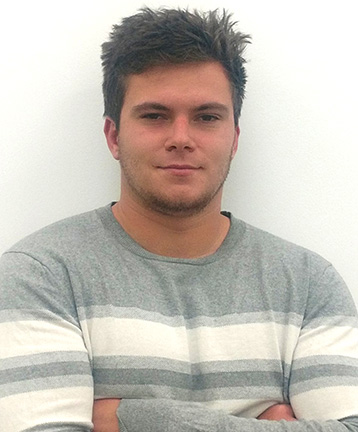
Cory Hague
Cory Hague works at Applied Medical, Calif., USA, in the R&D department as a senior research engineer. Cory is also currently working on his bachelor’s degree in physics and electrical engineering and is pursuing projects such as building a Sagnac interferometer that is sensitive enough to measure the Earth’s rotation. He is part of a group working to build a fully robotic and automated radio wave telescope from scratch. He has received $40,000 in funding for projects next year, one of them being a Mars Rover Competition.
When did you first become interested in robotics
When I hit my senior year in high school, I started gaining interest in robotics. And from there, I just kept going. I kept teaching myself all of the electronics I could. I started building things in my garage, like little hexacopters and robotic arms. Then, in college, I started taking optics classes, and the lectures encouraged me to start incorporating some of those systems in my drones and other things I was building.
And it was that experience that helped you get a research engineering job while still an undergrad?
I kind of leveraged those projects that I did, especially the ones with the optics as my more sophisticated systems, to get a job at Applied Medical. They almost entirely hired me based on the projects that they saw that I completed. Because, at that time, I didn’t really have anything reputable on my resume that said I would be good for a technical field. I think it was just the fact that I was extremely interested and passionate, outside of school and outside of the workplace, about doing these projects. My employers definitely liked it, especially because I was applying for a job in R&D.
How did your knowledge of optics set you apart?
I can’t think of a single educational background that has helped me more in my career. Because the optics apply to everything from, you know, the encoders that track position on any robotic system to range sensing to spectroscopy, obviously. And it’s definitely given me an edge up in the workplace.
I was the one guy who could do all of the electronics, do all of the robotics, but also integrate optical systems. It was nice to be able to think through the field and be able to apply those systems, especially because a lot of the stuff I was doing was for simulation with medical instruments. So, I was working on a whole bunch of systems mostly involving optics actually to track instruments.
My optics education has definitely helped me move up to a senior position. I’m still working on my bachelor’s degree though. I want to get my degree in physics and electrical engineering. But now my company is actually paying for my education.
So, coming from such an early career perspective, what kind of skills would you say are needed to get into this field?
I’d say a fundamental electronics and a fundamental programming knowledge is extremely important.
Being able to combine these three disciplines, optics, electronics and programming, magnifies your career opportunities. Once you know the basics of these three things, you just understand everything conceptually rather than just from a textbook. And it’s really easy to integrate the new things that you see in the industry.
Did you teach yourself most of the programming that you know on the job, or did you have any training in that?
I had my beginnings in my garage. But yes, everything is pretty much self-taught, either at my garage or at my job.
Initially I was brought in for communicating with the sensors. So, there were off-the-shelf sensors and they needed to be able to communicate with them, read them and program them. But what really made me successful was because I also knew the optics. So I was able to implement design and come up with my own designs that worked much better for the solution, and it really helped me innovate.
Your story shows what a new area this is, because you took an unconventional path to getting your job. So how would you view the opportunities in this field right now?
I will say the opportunities for optical scientists are extremely undervalued because of how much optics can benefit each of these departments. Because a lot of the departments here will lack optical expertise, but every department I’ve gone to and brought any of that knowledge, it’s been the perfect solution for all of them.
Now all of these departments are trying to hire people with optics professions, and they’re having trouble finding people. I’d say it’s one of the most desired fields, actually, because everything they do from automation to manufacturing to product solutions, it all requires optics. A lot of companies won’t realize that, that’s their solution until they’ve been exposed to it.
What advice do you have for students in optics right now who want to find a career in robotics and AI?
I’d say, the number-one thing is to find a project that you’re extremely interested in, and want to learn everything about. Everything I learned was from wanting to do something and not knowing how to get there and having to figure out how to get there. I think that’s extremely important.
